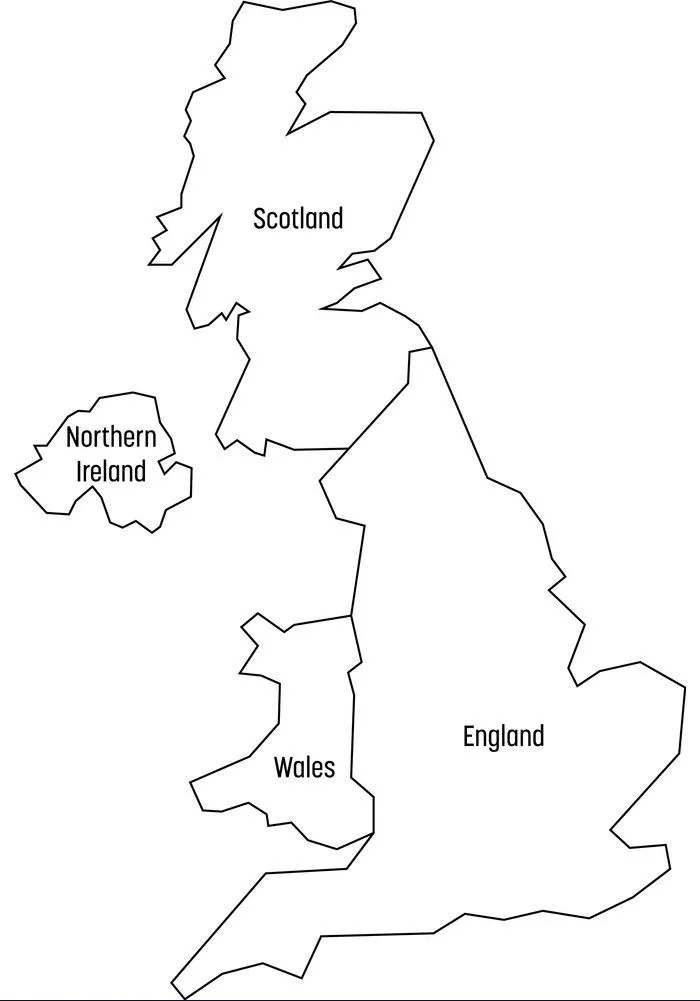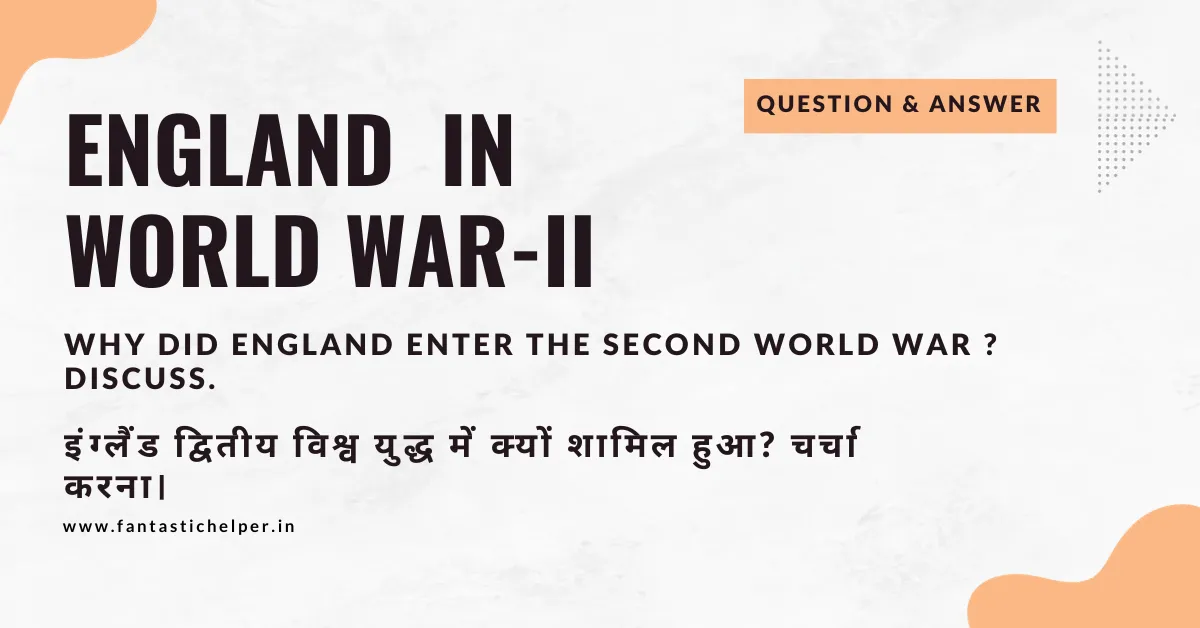Why did England enter the second world war ? Discuss.

इंग्लैंड द्वितीय विश्व युद्ध में क्यों शामिल हुआ? चर्चा करना।
द्वितीय विश्व युद्ध मानव इतिहास की सबसे महत्वपूर्ण घटनाओं में से एक था, जो 1939 से 1945 तक चला। यह एक वैश्विक संघर्ष था जिसमें दुनिया की लगभग सभी प्रमुख शक्तियाँ शामिल थीं, जो दो विरोधी सैन्य गठबंधनों में विभाजित थीं: मित्र राष्ट्र और धुरी। यह निबंध द्वितीय विश्व युद्ध के कारणों, प्रमुख घटनाओं और परिणामों पर चर्चा करेगा।
द्वितीय विश्व युद्ध के कारणों का पता प्रथम विश्व युद्ध के अंत तक लगाया जा सकता है। 1919 में हस्ताक्षरित वर्साय की संधि ने जर्मनी पर भारी जुर्माना लगाया, जिसमें क्षतिपूर्ति का भुगतान और क्षेत्र का नुकसान शामिल था। इससे जर्मनों में कटुता और आक्रोश की भावना पैदा हुई, जिसका एडॉल्फ हिटलर और नाज़ी पार्टी ने सत्ता में आने के लिए शोषण किया। हिटलर की विस्तारवादी नीतियां, जिसका उद्देश्य ग्रेटर जर्मनी बनाना और जर्मन राष्ट्रीय गौरव को बहाल करना था, युद्ध के प्रकोप में भी प्रमुख कारक थे।
द्वितीय विश्व युद्ध की प्रमुख घटनाएं 1 सितंबर, 1939 को पोलैंड पर जर्मन आक्रमण के साथ शुरू हुईं। इसके कारण 3 सितंबर, 1939 को ब्रिटेन और फ्रांस ने जर्मनी के खिलाफ युद्ध की घोषणा की। , नीदरलैंड और फ्रांस। इसके बाद हिटलर ने अपना ध्यान सोवियत संघ की ओर लगाया, जून 1941 में उस पर आक्रमण किया। 7 दिसंबर, 1941 को पर्ल हार्बर पर जापानी हमले के बाद संयुक्त राज्य अमेरिका ने युद्ध में प्रवेश किया। यूरोप में युद्ध 8 मई, 1945 को आत्मसमर्पण के साथ समाप्त हुआ। संयुक्त राज्य अमेरिका द्वारा हिरोशिमा और नागासाकी पर परमाणु बम गिराए जाने के बाद जर्मनी और एशिया में युद्ध 15 अगस्त, 1945 को समाप्त हो गया।
द्वितीय विश्व युद्ध के विश्व के लिए दूरगामी परिणाम हुए। इसके परिणामस्वरूप लाखों लोगों की मौत हुई और लाखों लोगों का विस्थापन हुआ। युद्ध ने संयुक्त राष्ट्र के गठन का भी नेतृत्व किया, जिसका उद्देश्य राष्ट्रों के बीच शांति और सहयोग को बढ़ावा देना था। इसने संयुक्त राज्य अमेरिका और सोवियत संघ के महाशक्तियों के रूप में उभरने का भी नेतृत्व किया, जिससे शीत युद्ध हुआ।
अंत में, द्वितीय विश्व युद्ध मानव इतिहास की एक महत्वपूर्ण घटना थी जिसके विश्व के लिए दूरगामी परिणाम हुए। युद्ध कारकों के संयोजन के कारण हुआ था, जिसमें वर्साय की संधि, हिटलर की विस्तारवादी नीतियां और तुष्टीकरण की विफलता शामिल थी। युद्ध की प्रमुख घटनाओं में पोलैंड पर जर्मन आक्रमण, जर्मनी द्वारा यूरोप के अधिकांश हिस्से पर विजय और पर्ल हार्बर पर हमले के बाद युद्ध में संयुक्त राज्य अमेरिका का प्रवेश शामिल था। युद्ध के परिणाम बहुत बड़े थे, जिससे लाखों लोगों की मौत हुई, संयुक्त राष्ट्र का गठन हुआ, और संयुक्त राज्य अमेरिका और सोवियत संघ का महाशक्तियों के रूप में उदय हुआ।
प्रधान मंत्री नेविल चेम्बरलेन के नेतृत्व में इंग्लैंड ने शुरू में द्वितीय विश्व युद्ध तक के वर्षों में नाजी जर्मनी के प्रति तुष्टिकरण की नीति अपनाई। इस नीति में संघर्ष से बचने के प्रयास में जर्मनी को रियायतें देना शामिल था।
हालाँकि, जब सितंबर 1939 में जर्मनी ने पोलैंड पर आक्रमण किया, तो चेम्बरलेन ने महसूस किया कि तुष्टिकरण विफल हो गया था और जर्मनी की आक्रामक विस्तारवादी नीतियों को बर्दाश्त नहीं किया जा सकता था। 3 सितंबर, 1939 को ब्रिटेन और फ्रांस ने जर्मनी के खिलाफ युद्ध की घोषणा की, इस प्रकार द्वितीय विश्व युद्ध की शुरुआत हुई।

इंग्लैंड के द्वितीय विश्व युद्ध में प्रवेश करने के कई कारण थे:
1.मित्र राष्ट्रों की रक्षा: ब्रिटेन ने जर्मन आक्रमण की स्थिति में पोलैंड को सैन्य सहायता की गारंटी दी थी। जब जर्मनी ने पोलैंड पर आक्रमण किया, तो ब्रिटेन के पास अपनी प्रतिबद्धता का सम्मान करने और जर्मनी पर युद्ध की घोषणा करने के अलावा कोई विकल्प नहीं था।
2.राष्ट्रीय सुरक्षा: जर्मनी की आक्रामक विस्तारवादी नीतियों से ब्रिटेन की सुरक्षा को खतरा था। जर्मनी ने पहले ही ऑस्ट्रिया और चेकोस्लोवाकिया पर कब्जा कर लिया था, और यह स्पष्ट था कि हिटलर की आगे की क्षेत्रीय महत्वाकांक्षाएँ थीं। ब्रिटेन को अपनी और अपने सहयोगियों की सुरक्षा के लिए कार्रवाई करनी पड़ी।
3.वैचारिक संघर्ष: द्वितीय विश्व युद्ध जर्मनी, इटली और जापान के नेतृत्व वाली धुरी शक्तियों और ब्रिटेन, संयुक्त राज्य अमेरिका और सोवियत संघ के नेतृत्व वाले मित्र राष्ट्रों के बीच लड़ा गया था। संघर्ष धुरी शक्तियों के फासीवादी, अधिनायकवादी शासनों और मित्र राष्ट्रों के लोकतांत्रिक, उदार शासनों के बीच एक वैचारिक विभाजन से प्रेरित था। ब्रिटेन के लिए यह उसके अपने लोकतांत्रिक मूल्यों और नाजी जर्मनी की फासीवादी विचारधारा के बीच संघर्ष था।
4.आर्थिक हित: जर्मनी के आक्रामक विस्तारवाद ने ब्रिटिश आर्थिक हितों को खतरे में डाल दिया। जर्मनी यूरोप पर हावी होना चाहता था और एक आत्मनिर्भर अर्थव्यवस्था स्थापित करना चाहता था जो ब्रिटिश व्यापार को बाहर कर दे। ब्रिटेन जर्मनी को यूरोपीय बाजारों और संसाधनों को नियंत्रित करने की अनुमति नहीं दे सकता था।
अंत में, ब्रिटेन ने अपने सहयोगियों की रक्षा, राष्ट्रीय सुरक्षा, वैचारिक संघर्ष और आर्थिक हितों सहित कई कारणों से द्वितीय विश्व युद्ध में प्रवेश किया। युद्ध में जाने का निर्णय हल्के में नहीं लिया गया था, लेकिन इसे ब्रिटेन के महत्वपूर्ण हितों की रक्षा करने और पूरे यूरोप में फासीवादी आक्रामकता के प्रसार को रोकने के लिए आवश्यक माना गया।
Answer in English
World War II was one of the most significant events in human history, lasting from 1939 to 1945. It was a global conflict that involved almost all of the world’s major powers, divided into two opposing military alliances: the Allies and the Axis. This essay will discuss the causes, major events and consequences of World War II.
The causes of World War II can be traced back to the end of World War I. The Treaty of Versailles, signed in 1919, imposed heavy penalties on Germany, including the payment of reparations and loss of territory. This created a feeling of bitterness and resentment among Germans, which Adolf Hitler and the Nazi Party exploited to come to power. Hitler’s expansionist policies, aimed at creating a Greater Germany and restoring German national pride, were also major factors in the outbreak of the war.
The major events of World War II began with the German invasion of Poland on September 1, 1939. Due to this, on September 3, 1939, Britain and France declared war against Germany. , Netherlands and France. Hitler then turned his attention to the Soviet Union, invading it in June 1941. The United States entered the war following the Japanese attack on Pearl Harbor on December 7, 1941. The war in Europe ended with surrender on May 8, 1945. The war in Germany and Asia ended on August 15, 1945, after the United States dropped atomic bombs on Hiroshima and Nagasaki.
The Second World War had far-reaching consequences for the world. This resulted in the death of millions of people and displacement of millions more. The war also led to the formation of the United Nations, whose purpose was to promote peace and cooperation among nations. It also led to the emergence of the United States and the Soviet Union as superpowers, leading to the Cold War.
In conclusion, World War II was a significant event in human history that had far-reaching consequences for the world. The war was caused by a combination of factors, including the failure of the Treaty of Versailles, Hitler’s expansionist policies, and appeasement. Major events of the war included the German invasion of Poland, the conquest of much of Europe by Germany, and the entry of the United States into the war following the attack on Pearl Harbor. The consequences of the war were enormous, leading to the deaths of millions of people, the formation of the United Nations, and the rise of the United States and the Soviet Union as superpowers.
England, under the leadership of Prime Minister Neville Chamberlain, initially pursued a policy of appeasement towards Nazi Germany in the years leading up to World War II. This policy involved making concessions to Germany in an effort to avoid conflict.
However, when Germany invaded Poland in September 1939, Chamberlain realized that appeasement had failed and that Germany’s aggressive expansionist policies could no longer be tolerated. On September 3, 1939, Britain and France declared war on Germany, thus beginning World War II.
There were several reasons for England’s entry into World War II:
1. Defense of the Allies: Britain had guaranteed military aid to Poland in the event of a German invasion. When Germany invaded Poland, Britain had no choice but to honor its commitment and declare war on Germany.
2.National Security: Britain’s security was threatened by Germany’s aggressive expansionist policies. Germany had already captured Austria and Czechoslovakia, and it was clear that Hitler had further territorial ambitions. Britain had to take action to protect itself and its allies.
3.Ideological Conflict: World War II was fought between the Axis powers led by Germany, Italy, and Japan, and the Allies led by Britain, the United States, and the Soviet Union. The conflict was driven by an ideological divide between the fascist, totalitarian regimes of the Axis Powers and the democratic, liberal regimes of the Allies. For Britain it was a conflict between its own democratic values and the fascist ideology of Nazi Germany.
4.Economic Interests: Germany’s aggressive expansionism threatened British economic interests. Germany wanted to dominate Europe and establish a self-sufficient economy that would crowd out British trade. Britain could not allow Germany to control European markets and resources.
Ultimately, Britain entered World War II for a variety of reasons, including the defense of its allies, national security, ideological conflict, and economic interests. The decision to go to war was not taken lightly, but was considered necessary to protect Britain’s vital interests and prevent the spread of fascist aggression throughout Europe.
